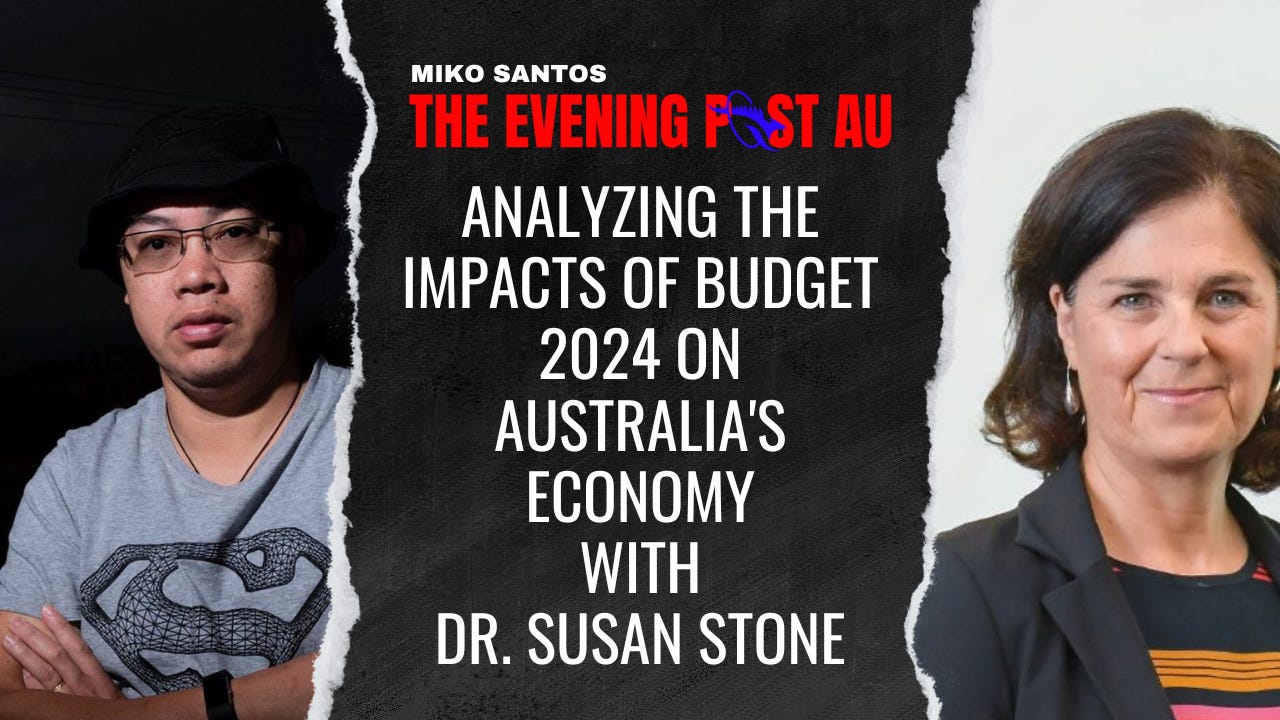Today’s episode is brought to you by Empower your podcasting vision with a suite of creative solutions at your fingertips.
On this episode of the FreeMan Podcast Chronicle, host Miko Santos discusses the recently announced Budget 2024 with guest Dr. Susan Stone, an expert in economics.
They delve into the details of the budget, including the 9.3 billion surplus and the 28.3 billion deficit projected for 2024 to 2025. Dr. Stone explains the concept of surplus and deficit in government finances, shedding light on the reasons behind these numbers. Tune in to gain insights into the budget implications and economic outlook for the future.
If you want to chat more about this topic, I would love to continue this conversation with you, over twitter @realmikosantos!
This is not a sponsored video/Audio . A small commission will be paid to us if you purchase anything through some of the affiliate links in our product listings.
In this episode, we cover:
[00:03:26] Budget impact on economic growth.
[00:08:55] New housing investment plan.
[00:10:51] Skills mismatch in Australia.
[00:16:43] Rise in industrial policy.
About the Guest:
Susan Stone is the Credit Union SA Chair of Economics at UniSA, undertaking research on issues pivotal to the State of South Australia. Prior to joining UniSA Dr. Stone was a division head at the OECD, a Director for the UN Economic and Social Commission for Asia and the Pacific (ESCAP), a Senior Research Fellow at the Asian Development Bank Institute in Tokyo, a Research Manager at the Australian Productivity Commission in Melbourne and a Senior Analyst at the US Environmental Protection Agency in Washington DC.
Her work has been published as national and multinational government reports, edited volumes, and in peer-reviewed journals. Ms. Stone holds a PhD in Economics and a Master’s Degree in Business and Finance, from Drexel University in the United States.
Resources and links mentioned in this episode:
Connect with Dr. Susan through her Linkedin and UNISA Website
Thank you to Australian Parliament for the short news report audio clip.
One of the key points discussed in the podcast episode is the Budget for 2024, which includes a surplus for the current year but anticipates a deficit for the following year. The surplus in the current year is attributed to high tax revenue and strong commodity prices, allowing the government to bring in more money than it has spent. However, the following year is expected to see a shift in economic variables. Factors such as a potential increase in unemployment and uncertain commodity prices are likely to impact the government's revenue stream, leading to a deficit where spending exceeds income.
Dr. Susan Stone, the guest on the podcast, explains that the budget's surplus for the current year is a result of favorable economic conditions, such as high tax revenue and commodity prices. However, the anticipation of a deficit in the following year is due to the expectation of lower revenue and increased spending. This change in economic variables underscores the dynamic nature of budget planning and the need for flexibility to adapt to shifting economic conditions.
The discussion highlights the importance of understanding the economic landscape and adjusting budget projections accordingly. It also emphasizes the need for governments to be prepared for fluctuations in revenue and expenditure, especially in the face of uncertainties such as changing employment rates and commodity prices. By acknowledging and addressing these variables in budget planning, governments can better navigate economic challenges and ensure financial stability in the long term.
The 2024 budget, as discussed in the podcast episode, places a significant emphasis on addressing the cost of living for Australians. Various measures have been introduced to alleviate financial burdens and support individuals and businesses facing economic challenges. One of the key initiatives highlighted in the budget is the provision of a $300 electricity bill rebate for households, aimed at reducing the financial strain on families dealing with rising energy costs.
Additionally, the budget includes a 10% increase in rent assistance, acknowledging the difficulties faced by individuals struggling to afford housing. This measure is crucial in ensuring that vulnerable populations have access to affordable accommodation, thereby improving their overall quality of life.
Moreover, the budget allocates substantial support for small businesses, recognizing their importance in driving economic growth and employment opportunities. With 4 million small businesses set to benefit from $290 million in cash flow support, these initiatives aim to bolster the resilience of small enterprises and contribute to the recovery of the business sector.
Furthermore, the budget prioritizes $500 million for skill development, emphasizing the significance of investing in human capital and workforce training. By addressing skills shortages and enhancing the capabilities of the labor force, these initiatives not only support individuals in securing employment but also contribute to the overall productivity and competitiveness of the economy.
Overall, the budget's focus on cost of living measures, electricity bill rebates, rent assistance, and support for small businesses and skill development reflects a comprehensive approach to addressing economic challenges and improving the well-being of Australians. These initiatives demonstrate a commitment to fostering financial stability, promoting business growth, and enhancing the skills of the workforce to ensure a more prosperous and resilient future for the nation.
One of the key points discussed in the podcast episode is how the Budget 2024 aims to address specific issues such as housing supply, skills mismatch, and industrial policy. While these are crucial areas that need attention, there is a notable absence in directly tackling broader economic issues like the competitiveness of the business environment.
Dr. Susan Stone highlighted the importance of addressing the rise in industrial policy, where governments are increasingly involved in steering the economy in certain directions. This global trend, coupled with geopolitical tensions, is influencing corporate decision-making processes. Businesses are reevaluating factors such as where they operate, their supply chains, and future investments. To remain competitive in this evolving global landscape, Australia needs to demonstrate that it is a favorable place to do business. This involves having a skilled labor force, robust infrastructure, and a conducive business environment.
While the budget allocates funds for initiatives like new housing investments, skills training, and industrial policies, it may not directly address the broader issue of enhancing the business environment's competitiveness. Dr. Stone emphasized the importance of showcasing Australia as a desirable location for businesses by ensuring it has the necessary elements to support economic growth and attract investments. This includes creating a favorable regulatory environment, investing in infrastructure, and promoting innovation and entrepreneurship.
Therefore, while the budget takes steps to tackle specific challenges like housing supply and skills mismatch, there is a need for a more comprehensive approach to enhance the overall competitiveness of the business environment. By addressing these broader economic issues, Australia can position itself as a strong contender in the global market and drive sustainable economic growth in the long term.
🚀 TOOLS AND SERVICES I RECOMMEND:
🎥 My favorite's tagging, channel growth, and management tool for YouTubers
► Download TubeBuddy Free Today! ➜ https://bit.ly/Tubebuddy-realmikosantos ► Download VidIQ ➜ https://bit.ly/vidIQ-realmikosantos
🎵 WHERE DO WE FIND OUR MUSIC:
► Epidemic Sound ➜ https://bit.ly/epidemicsound-AU
🎙️ OUR REMOTE RECORDING SOFTWARE
Zencastr - https://bit.ly/Zencastr-realmikosantos
📼 OUR PODCAST APPS ARE USING
Transistor FM –
https://transistor.fm/?via=realmikosantos
Captivate FM - https://www.captivate.fm/signup?ref=realmikosantos
Fiverr - https://bit.ly/Fiverr-realmikosantos
Headliner - https://bit.ly/Headliner-realmikosantos
📹 OUR VIDEO GEARS WE ARE USING
📼 MIKO'S KIT
This podcast is powered by Kangaroofern, Australia's Independent Podcast Management Company.
Thanks so much for listening to our podcast!
If you enjoyed this episode, be sure to subscribe so you'll be notified when a new episode is posted in the Apple podcast, Google podcast, Spotify, Stitcher or via RSS.
If you think others could benefit from listening, please share it on your socials.
You can also subscribe to the podcast app on your mobile device.
If you found value in this episode, leave us an Apple Podcast review. Ratings and reviews from our listeners are extremely valuable to us and greatly appreciated. They help our podcast rank higher on Apple Podcasts and expose our show to more awesome listeners like you.
This is a premium episode. If you would like to discuss this with other subscribers or get access to the episodes, visit The Freeman Chronicle
Got a News Tip?
Contact our editor via Proton Mail encrypted, X Direct Message, LinkedIn, or email. You can securely message him on Signal by using his username, Miko Santos.
More on The Evening Post AU
Get Evening Post Wrap - for nighly bite size news around Australia and the world.
Podwires Daily - for providing news about audio trends and podcasts.
Podwires Asia - for reporting on podcasting and audio trends in South East Asia
There’s a Glitch - updated tech news and scam and fraud trends
Anti - A __ - The world's and Asia's most inventive advertisements and news.
The Freeman Chronicle Podcast - features expert interviews on current political and social issues in Australia and worldwide.
That Podcast Exchange - This podcast is an insightful conversation with people at the top of their game and deconstructs them to find the tools, tactics, and tricks to help you achieve your dream goal as Podcast Manager.



















Unveiling the Key Economic Issues in Budget 2024